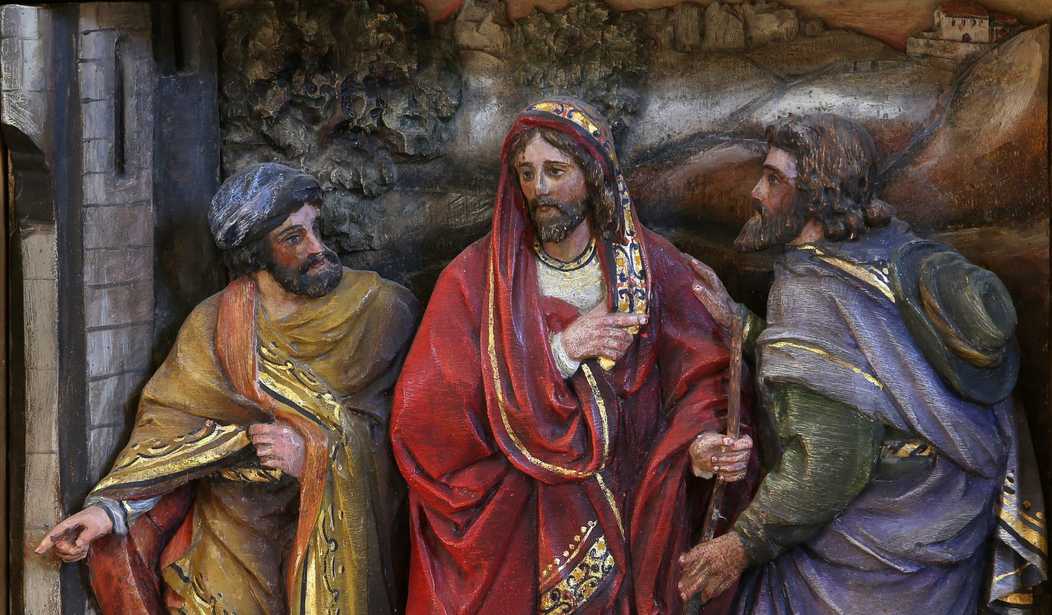The Revised Common Lectionary’s Gospel reading for April 30 is the story of the two disciples meeting Jesus on the road to Emmaus and listening to Him explain Scripture to them and then joining Him for a meal, never even recognizing Him until He broke the bread.
This is one of several high-profile stories in which even people close to Jesus don’t recognize the resurrected Christ. Mary Magdalene, for example, thought He was the gardener when she first saw Him outside His empty tomb.
This is passing strange.
Yet it is part of a pattern in which the risen Lord is less than fully corporeal. For all His followers’ insistence that Jesus returned in the flesh, so obviously as somebody with a living body that they were able to see and feel His wounds, they also describe Him as being utterly unmoored to the ordinary physical world. Not only is He a shape-shifter, able to assume appearances that make Him unrecognizable to His close friends, but he also is a will-o’-the-wisp — entering through locked doors; sometimes in two places so nearly simultaneously that no ordinary person could traverse such large distances in so little time; disappearing repeatedly from their sight as if His appearances were mere phantasmagoria.
To those who are literal-minded, this is very confusing indeed. Was He body, or was He spirit? (Was it real, or was it Memorex?)
Of course it is easy to say that a God who can create the whole universe, who can heal cripples and give sight to the blind, and who can raise Himself from the dead, can surely do the comparatively easy trick of alternating between flesh and spirit as it best suits His purposes. Still, one must ask, why does He choose to present Himself in this way, thus confusing the heck out of the very friends and followers He will need to be most sure of Him in order that they are moved to spread His good news far and wide while risking their very lives to do so?
And why do the disciples choose to tell the story this way? Wouldn’t it be more believable if the stories they told of the body risen from the tomb were more consistent?
Here, though, we pause. Just as in last week’s reflection I posited that “no matter how many details the Gospel writers recorded, people who were not there would tend to disbelieve if their general inclinations were to be skeptics,” here too we can see a sort of reverse-psychology at work. If the disciples were making it all up, wouldn’t their stories be more neatly tied together? Wouldn’t they choose to be more consistent, less confusing, more attuned to trying to make their stories fit into the ordinary, earthly rules of time and place and substance?
Why would they deliberately make an already hard-to-believe story of a resurrection even more hard to believe by having their hero flit back and forth between spirit and flesh and between recognizability and various disguises?
Jesus knows this. Jesus-as-God knows this. But He also knows that, as in criminal trials, a story that is too “pat” is also one that can be less believable by very virtue of being too tidy for real life.
If the answer to our riddle is that the only reason the disciples would tell their stories the way they do is that the events actually happened as they described the events (because otherwise they would concoct something tidier, if they were trying to trick us), then… maybe the reason Jesus chose such atypical presentations is because He was exercising a divine version of strategic ambiguity.
Jesus could be telling us that once He had experienced and then transcended human death, He, as God, would return to acting in ways that aren’t bound by human expectations and human logic.
While Jesus walked the earth, He was immanent, but now He is transcendent. We should not expect Him to remain within earthly rules any more than we ourselves should try (as William F. Buckley would say) to immanentize the eschaton.
God will act in ways that He alone knows will best teach His lessons and achieve His purposes. We must just trust that His shape-shifting and time-bending are indeed wisely purposive.
As the two Emmaus travelers experienced it, so too should we allow God to use mysterious ways to reach us — so that, like them, we can feel “our hearts burning within us” at the wonder and glory of His presence.
Quin Hillyer is a veteran conservative columnist with a degree in theology. His faith-themed satirical novel, Mad Jones: Heretic, is due for publication in June by Liberty Island Media.









Join the conversation as a VIP Member